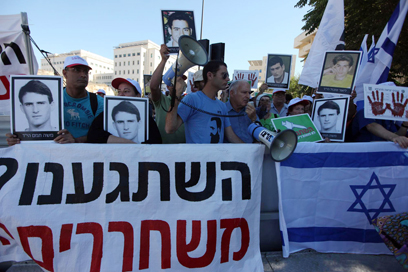
Government approves prisoners' release
Cabinet okays decision to release 104 prisoners; 13 in favor, 7 opposed, 2 abstained. 'There are moments in which difficult decisions must be made,' PM says. PA welcomes decision
According to the resolution, 104 prisoners will be released and a ministerial committee to be headed by Netanyahu and ministers Ya'alon, Livni, Aharonovitch and Peri will be established to supervise the process as part of the negotiations with the Palestinians. In addition, if it would be decided to release Arab-Israeli prisoners, the matter will be brought for reapproval of the cabinet.
Related stories:
- Op-ed: Decision to release prisoners legitimate
- Cabinet approves referendum bill
- Terrorists' families: No release – no deal
Voted in favor: Prime Minster Benjamin Netanyahu, Defense Minister Moshe Ya'alon, Interior Minister Gideon Sa'ar, Minister for Strategic Affairs Yuval Steinitz, Internal Security Minister Itzhak Aharonovitch, Immigrant Absorption Minister Sofa Landver (Likud-Beiteinu), Finance Minister Yair Lapid, Health Minister Yael German, Science and Technology Minister Ya'akov Peri, Welfare Minister Meir Cohen, Education Minister Shai Piron (Yesh Atid), Justice Minister Tzipi Livni and Environmental Protection Minister Amir Peretz (Hatnua).
Voted against: Transportation Minister Yisrael Katz, Home Front Minister Gilad Erdan, Tourism Minister Uzi Landau, Agriculture Minister Yair Shamir (Likud-Beiteinu), Economy Minister Naftali Bennett, Housing Minister Uri Ariel, Senior Citizen Minister Uri Orbach (Habayit Hayehudi).

Tough decisions (Photo: Koby Gideon, GPO)
Following the cabinet's approval, Prime Minister Netanyahu said: "This is not an easy moment for me; it is not easy for the cabinet ministers, and it is particularly not easy for the bereaved families."
Netanyahu added: "There are moments in which difficult decisions must be made for the benefit of the State, and this is one of those moments."
The vote stirred tensions in Netanyahu's coalition and in a bid to sway ministers and calm their concerns, during the cabinet meeting, Netanyahu said that despite the heavy price, "not entering the (peace) process will also exact a price. Entering the process will advance Israel's strategic interests. Any provocation on the part of the Palestinians will stop the release (of prisoners)."

Bereaved familes protest release (Photo: Gil Yochanan)
Nonetheless, Minister Naftali Bennett, who voted against the decision, said "It if a difficult day for the entire government and the decision has been made... Unfortunately, today's decision will one day bring the release of the Fogel family murderers."
Bennett further said: "We once released a terrorist in exchange for a live soldier, then we released hundreds of terrorists for a live soldier, then terrorists for dead soldiers and now 100 terrorists for a 'process'. We are teaching the world that everything is negotiable with us."

Bennett (center) with protesters (Photo: Roee Idan)
Minister Ya'akov Peri also commented the vote and said: "As one who was responsible for the pursuit and arrest of many of these murderers, I know it is a tough and heartbreaking decision."
Peri, who will take part in the limited ministerial committee that will supervise the release of prisoners, added: "The decision to renew negotiations with the Palestinians is a strategic and vital step for Israel. The team will carefully examine who and when to release."
Palestinian response
The Palestinian Authority welcomed the decision, as chief Palestinian negotiator Saeb Erekat said: "We welcome the decision of the Israeli government to release prisoners who were arrested before the Oslo Accords."
He argued that the "decision by the Israeli government is a move that should have been launched in the implementation of the Sharm el-Sheikh Memorandum in 1999, when Israel made a commitment to release those prisoners.
"We urge Israel to seize the opportunity created by US Secretary of State John Kerry regarding the resumption of the negotiation, so as to put an end to decades of occupation and exile and start a new phase of justice, freedom and peace to Israel and Palestine and the rest of the region," Erekat asserted.
Palestinian Minister of Prisoner Affairs Issa Karaka added that the decision was a "big achievement that fortifies the just peace in the region.
The chief Palestinian negotiator nonetheless noted: "We will continue to promote the release of all prisoners."
As part of his efforts to convince ministers to support his proposal, the prime minister decided Thursday to defer the decision on the release of Arab-Israeli prisoners to a later date and only discuss the release of Palestinian prisoners. "Any decision on the release of Arab Israelis, if such a decision is reached, will be sent for reapproval by the government," he stressed.
However, a senior Palestinian source spoke to Ynet and said that the Palestinians agreed to return to peace talks only after receive assurances from the Americans that the Israeli-Arab prisoners will also be released.
"The only prisoner list that Israel has is the list we passed onto John Kerry so he could give to the Israeli leadership. All the statements made by Israeli officials are politics and nothing more."
Moran Azulay, Elior Levy, AFP contributed to this report
- Receive Ynetnews updates directly to your desktop










